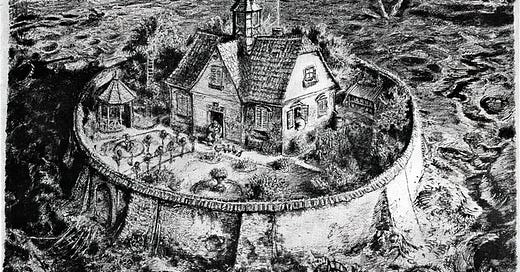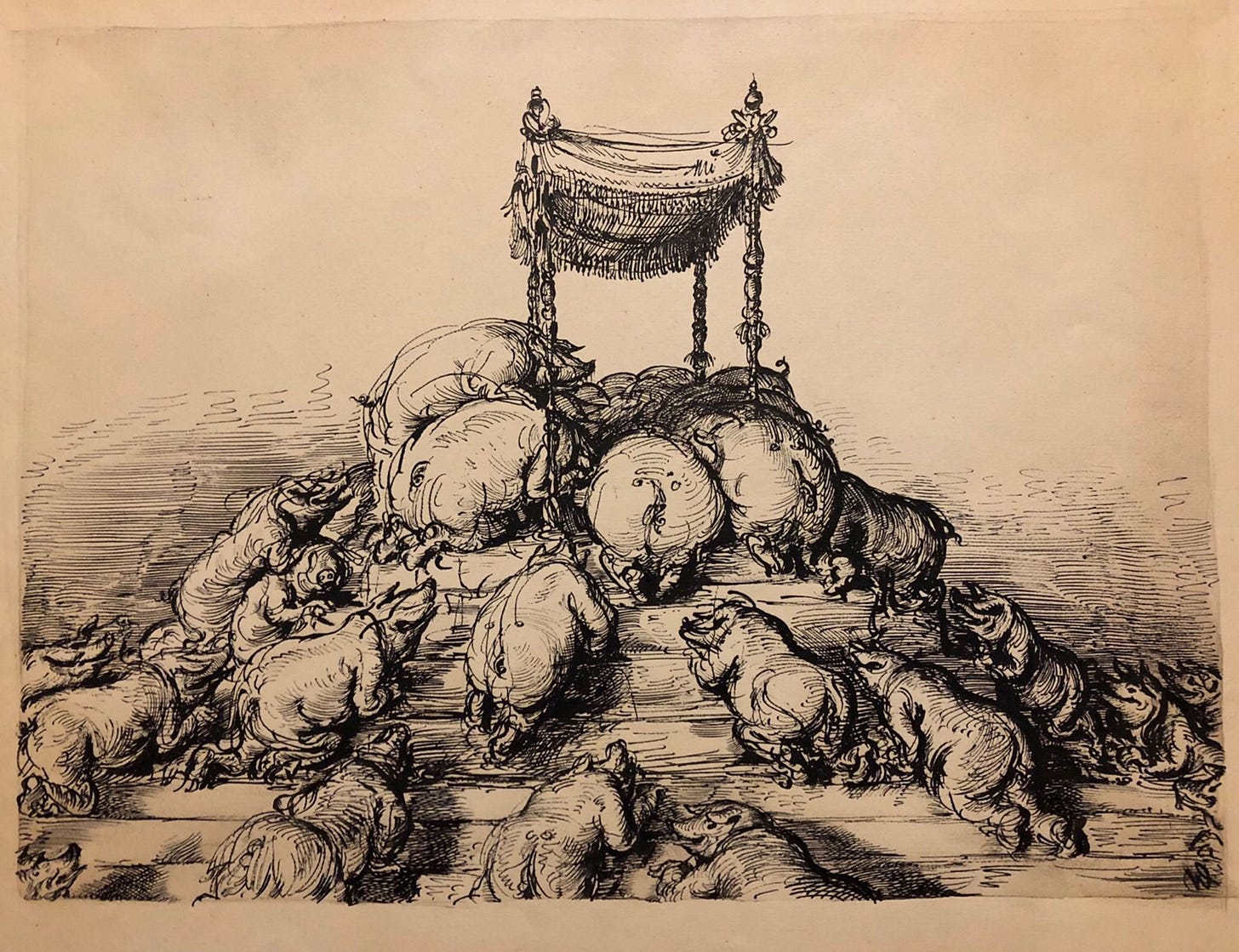New Look - Ernst Niekisch
This is a guest post by Authenticity
The Syndicalist Papers - Authenticity Blog
Published in 1930
“People make history”, how many reservations, restrictions, additions can be made in relation to these words, the only thing that is undoubted is that the activity aimed at creating a new history serves as a prerequisite for developing a new view.
Only extraordinary people are able to assess the situation before fatal processes set in motion and can be embodied. Any great task that history sets requires a human type corresponding to it. Those who work decisively and innovatively for the future must already be caught up in the spirit of that future.
It is obvious what a strange and mysterious looking human type the German freedom fighter, the German “nationalist” is. For the German people themselves, he still remains a man from another world, a terrible guest with strangely burning eyes, with a restless soul, from whom a mysterious chill emanates, with only an implicitly felt readiness to jump, with an absence of sentimentality uncharacteristic for Germans, with a striking indifference to existing circumstances, with the inability to adapt, inaccessible to the perception of other people, with a willingness to do any business. This man was formed under the influence of a fatal event that forever pulled him out of the bonds of his present: the fate of Germany appeared before him in all its terrible nakedness and frightening hopelessness; he felt the icy wind of hopelessness and hovered over the abyss of gloomy despair. In doing so, he learned to recognize the necessary and ruthlessly despise everything accidental. He has developed that cruelty with which he does not hesitate to take on what is perceived as necessary and ruthlessly swing the hammer to destroy even the happiness of small people if it gets in the way of striving for German freedom.
And on the road at the present time, most of all is what we inherited from the time before 1914. That Germany, which passed the test of the world war and failed to endure it, no longer has the right to exist, even in a rudimentary form. The remains that have been preserved since 1918 are no longer building material, but ballast, garbage, ruins that suffocate life. But the hearts of thousands of people are still attached to them. Once all this was their happiness, and now this is the last thing they still have in their hands: wonderful memories, a straw that alone still does not allow them to drown. But frantically defending the ruins, they have neither the tools nor the strength to carry out the work that is entrusted to our people.
That is why the nationalist takes up the shovel to clear the space. He does not pay attention to political forms, social orders, economic institutions. They overthrow the walls, behind which everything devoid of ambition, downtrodden and abandoned, still finds shelter and protection from rain and wind. He appears to be a nihilist, a burrowing mole, perhaps a bomber and a conspirator against all that is still considered sacred. His worldview, his values are completely out of date; they remain “out of time”, which is incomprehensible and attractive at the same time.
It follows from the peculiarities of the structure of modern society that it is the nationalist who must be alien to the bourgeoisie and hostile to it. Bourgeoisism has crippled Germany, he regards bourgeoisness as a leprosy, and he enters into a struggle with bourgeoisness in the life of the German people, as one should do with an epidemic. He is too courageous, too resolute, too militant, too obliging to still remain bourgeois in some respects, he knows that the same courage and will to fight, the same determination and commitment must be kindled in the German people, if he wants to overthrow off the burden of reparations. It is precisely this avoidance of decision, this propensity for shameful negotiations and compromises, this love of peaceful pleasures and dull rest: it is precisely this that keeps Germany in her impotence and dishonor. No peace attracts a nationalist; devotion to the nation makes him an adventurer.
“Anti -bourgeoisness” has so far been confused with adherence to Marxism. But from the point of view of the new nationalism, bourgeoisness and adherence to Marxism turn out to be an indissoluble unity. Bourgeoisism and Marxism coincide in worldview and value orientations; wealth is put on a pedestal. The purpose of being in general is well-being and well-being, pleasure and provision, wealth and security. The basis of the whole worldview is the economy; the state, acting in itself as a purely political phenomenon, is included in the process of erosion of its nature as a harsh and inflexible instrument of domination; it turns here into a liberal legal state, which is left with just the functions of a guard dog. After it has definitively slid down to the level of the welfare state, it is finally thrown into the closet. Foreign policy becomes the embodiment of bargaining for markets, hunting for deposits of raw materials, regulation of international trade relations; internal politics is done in class battles, and if things are going well, then in class compromises.
The nationalist stands just as far from the bourgeois as from the Marxist, and both see him as their denier, their incorruptible enemy. He is precisely the person in whom the will to life of the German people finds its direct embodiment, the person through whom the vital foundations of the people, which have existed for thousands of years, put forward their demands. The voice of German blood resounds in and through it. The fact that he loses reverence for today and yesterday is due to the fact that he has an incomparable respect for what rests before this today and yesterday, and what must come into the light of God. Only before the Great One does he feel indebted and very seriously, not interested in anything else, he accepts this debt. He inspires fear in the existing system, because it seems to be devoid of any guidelines; he cares neither about monarchy, nor about republic, nor about autocracy, nor about socialism. He focuses solely on the vital needs of his people. This law is a measure by which he determines his attitude to the world around him, all the surrounding phenomena and institutions are valuable to him exactly as much as they meet the needs of the development and strengthening of his people, but in themselves they mean nothing. He is intolerant of all legal norms, orders, customs, goods and values that want to have some intrinsic virtue; stubbornly insisting on their inherent right, they scatter and split the forces of the people and distract it from the struggle for self-assertion. The vital needs of the German people are so limitless that the surroundings must be regarded solely as a set of means for satisfying these needs, the place of each means is determined by the degree of its usefulness for the purpose of self-preservation of the people.
It is necessary to think and act, from the very beginning proceeding directly from the will to live, the value orientations and the desire of the people for self-preservation: this is politics in the most correct sense of the word. Politics is pure predestination, calling for action; the nationalist is the executor of this destiny, he is simply and without any reservations a politician.
He sees in himself the executor of the destiny: this endows him with steadfastness, endurance and perseverance, courage and firmness, at the moment also courage in the face of the most terrible. This gives him such a capacity for movement, which is useful in any secluded corner or ambush, on any side path and roundabout, and will never allow you to go astray, but will always indicate the right direction. Thanks to this, his conscience is clear, even at the moment when he breaks the gods and burns the temple: he has confidence that the divine principle in his people remains unharmed. This gives him a justification: just acting in accordance with the will of his people, he is capable of everything, everything is allowed to him, to the extent that he embodies this will, he knows no limits, he is a sovereign.
Feeling neither hatred nor love, the sovereign casts his searching gaze on the bourgeois world. By virtue of the priority of the vital needs of the German people, he must not feel the horror of him, which is still deeply rooted in the hearts of the masses. A safe with money is not a sanctuary for him; this safe belongs to an alien, vile religion, whose cult forms and divine images are destructive and therefore disgusting. The rate of profit does not drive him crazy, for him it is impure, stinking money intended for bribery, with which they want to seduce the German people and fail their mission. The “patriotic” bourgeois wants only to talk about the nation, but not to sacrifice his miserable property. The fact that a nationalist rips off the mask from a bourgeois and exposes his cowardly, pitiful frivolity to the light of day hurts the bourgeois most painfully and fills him with that poisonous hatred that one would like to get rid of an uncomfortable soothsayer by stabbing him in the back, slandering him in a splattering saliva to the press and plotting to rot in the humanitarian air of progressive prisons.
Art by A. Paul Weber. Illustrator for Widerstand.








